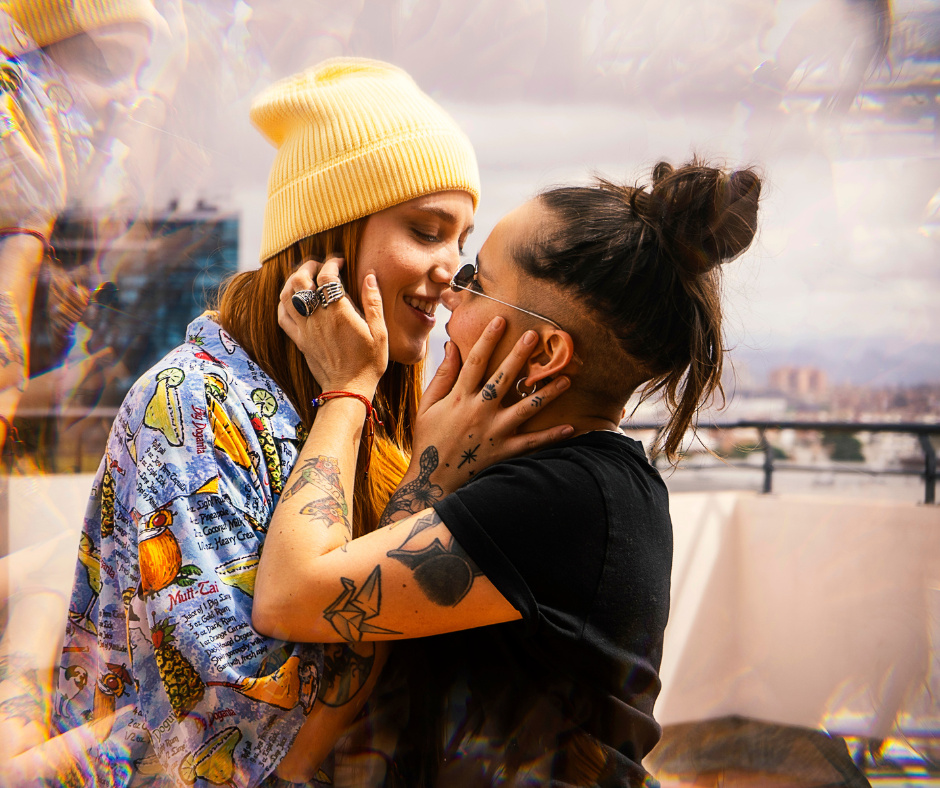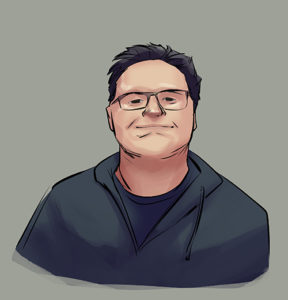Hey there, wonderful readers! Today, I want to talk about the joy of happy endings in sapphic novels—books that Ylva publishes. But first, let me introduce myself: My name is Astrid Ohletz, founder and CEO of Ylva Publishing.
From time to time, I’ll be inviting you to take a sneak peek behind the scenes of a publisher’s oh-so-chaotic life. And guess where we’re kicking things off? Right at the heart of what makes me tick—the significance of those heartwarming happy endings in books that celebrate love between women.
Let’s Talk About Sapphic Novels
In November 2022, I got a call from this adorable little bookshop in Frankfurt, which happens to be the closest city to our Ylva office. They wanted me to be one of two representatives of fabulous queer publishing houses to be featured in a live interview at this bookshop. And guess what? It was going to be broadcasted on HR2, a well-known public radio station for all the folks in Germany into books, music, and all things cultural. No annoying commercials, just pure culture.
I must admit that I’m not exactly tuning in to HR2 every day. But tens of thousands of people do, and they hang on every word said on that station. So, naturally, I said “yes!” when they asked me to be part of this. It’s so difficult to get visibility for Ylva and what we do, so when opportunities like this come knocking, I’m all in!
So, grab your favorite cup of coffee, sit back, and let’s dive into why this radio interview made me one of the biggest defenders of happy endings in women-loving-women books, something I never expected to happen at this event.
From Radio Interview to Defender of Happy Endings
Honestly, I had no clue what I was getting into, no idea what questions would come my way. Talk about nerve-wracking, right? But here’s the deal: about 30 lovely souls showed up, along with the bookshop crew and a couple of folks from the radio station. One was handling all the technical wizardry for the interview, and the other was, of course, our moderator.
We got through the introductions and were having a grand old time. The questions were smart, and everything was going just swimmingly until the moderator dropped a bombshell question, something like, “So, Astrid, do all your books really end happily? Isn’t that boring?” And that, my friends, was when I found myself on a mission to defend happy endings in books for a solid fifteen minutes!
I mean, seriously, it was mind-boggling. The moderator and the tech person from the radio (she couldn’t hold back her questions at this point) just couldn’t wrap their heads around why I’m such a firm believer in the power of a good, old-fashioned happy ending. In their eyes, good literature needs death and tortured souls.
But here’s what I had to say: there are already a gazillion books out there with those dark and twisty plots. Go read them. You’re welcome. I do that myself from time to time. Our readers, however, want and need those feel-good, heartwarming endings, and for good reasons.
In the end, we all left the event as pals, but we just couldn’t see eye to eye on this one point. Sometimes you’ve got to stand your ground—am I right?

Five Reasons Why LGBTQ+ Books Need Happy Endings
So, why do we in the LGBTQ+ community need books that end happily? Let me list five reasons:
1. Representation matters, not only in sapphic novels
A big reason why happy endings are so important in women-loving-women books is because they offer much-needed representation. For a long time, us LGBTQ+ individuals had limited visibility in literature, film, and other media. But now, we’re finally seeing more diverse stories and even movies that reflect our lives, our struggles, and our love.
Seeing characters like us go through trials and tribulations but ultimately find happiness is a powerful validation of our own experiences. It tells us that our stories are just as valid, just as beautiful, and just as deserving of a happy ending as anyone else’s. It helps break the cycle of erasure and exclusion.
2. Life can be tough when you’re part of the LGBTQ+ community
Let’s face it: life can throw us some major curveballs. Whether it’s the challenges of coming out, dealing with discrimination and sexism, or simply navigating the ups and downs of everyday life, being a part of the LGBTQ+ community can be a unique journey. That’s why happy endings in women-loving-women romance are not just a form of escapism—they’re a lifeline. They were my lifeline for many years, and I know that I’m not alone. The need to see happy endings in books starring LGBTQ+ characters was a main reason I founded Ylva Publishing back in 2012.
I do believe that when we immerse ourselves in these positive stories, we get to experience the emotional rollercoaster of love, just like any other reader. But there’s something incredibly powerful for a woman that loves women, for queer women, and for lesbians about seeing two women finding happiness and fulfillment in each other’s arms. It sends a message that no matter what we face in real life, there’s always hope for love and joy.
3. Love is love
Love doesn’t discriminate, and it certainly doesn’t care about the gender of the people involved. Lesbian romances that end happily reinforce this idea and remind us that love and desire between women are just as deep, passionate, and genuine as any other romantic love.
The stories we read and share play a vital role in challenging stereotypes and prejudices. When we celebrate love in all its forms, we create a more inclusive and accepting world. Happy endings in lesbian romance novels help chip away at the ignorance and fear that still persist in some corners of society.
4. Love is empowering
Happy endings in lesbian romance aren’t just about “happily ever after.” They’re about empowerment. These stories show us that we have the strength to overcome adversity and embrace love openly. They inspire us to be unapologetically ourselves and to seek happiness on our terms.
Every time we read about women fighting for their love, it’s a reminder that we can do the same. It’s a call to action that says, “Don’t settle for less; you deserve the love and happiness you desire.” And isn’t that a message we could all use more of?
5. Sometimes we need a reminder of the power of hope
I’ve always been a big fan of optimism and hope, and that’s what happy endings in lesbian romance offer—hope. Life is full of uncertainties, and it’s easy to get bogged down by the challenges we face. But when we read these stories, we get to escape into a world where love conquers all.
Lesbian romance novels provide a haven where hope is alive and well. They remind us that love can and will prevail, no matter what obstacles stand in its way and that even in the darkest of times, there’s a chance for love to light the way.
Breaking Stereotypes: The Diversity of Sapphic Novels
The LGBTQ+ community is as diverse as any other, and happy endings in lesbian romance help to break down stereotypes and broaden our horizons. These stories showcase the wide range of experiences, personalities, and backgrounds within our community, and portray them in a positive light.
From historical romances to contemporary tales, lesbian romance novels give us the chance to explore different facets of our identities. They tell us that there’s no one “right” way to be a lesbian and that love knows no bounds. This, in turn, encourages acceptance, understanding, and unity within our community.
Celebrating Love and Happiness: The Impact of Happy Endings
So, dear readers, never underestimate the power of a good book with a happy ending, especially for us. The stories in women-loving-women books are not just tales of love; they’re affirmations of our existence, celebrations of our diversity, and reminders that we deserve every bit of happiness that life can offer.
These novels are beacons of hope and progress. So let’s keep reading, sharing, and celebrating them. After all, what’s more important than spreading love, acceptance, and a bit of happiness?
Well, that was my first blog post. As mentioned above, there will be more posts coming where I’ll share a sneak peek behind the scenes of a publisher’s oh-so-chaotic life. My next entry will be about an event where I had to explain a certain lesbian romance trope about a hundred times, especially to younger readers, who had never heard of it.
Oh, and if you want to listen to the (German) interview I talk about in this blog post… here you go: Interview
Astrid Ohletz is the founder and CEO of Ylva Publishing. Being able to publish books where subtext is maintext is a dream come true for her.



Astrid,
Thank you so much for this blog post. HEA in our stories is critical within our community! All the reasons you list are exactly correct. We are all happier, safer, and stronger by having representation in all countries, professions, religions, and cultures. Love is love in many, many forms. Sapphic authors empowers us all.
Thank you, Astrid, for this opinion piece and your explanation about a matter of the heart. Your heart. I like your heart. It is kind. And moreover and perhaps even more important: thank you for Ylva.
It’s not a romance unless it has a happy ending! I don’t want ambiguity or something depressing, I read to get away. I made the mistake of reading a new released sapphic novel that wasn’t a romance, although the story was based on two young females in a relationship with each other. But it ended with the dead lesbian, and evil lesbian cliche that still persists in tv shows and movies far too much. I wanted to throw the book through a window I was so mad that this is the representation young adults and teens will read about themselves.
So yes. Give me all the happy endings every day.
Thank you for defending happy enndings. Right now I need to remember that love abounds in my community. I live in the USA. I expected better of my country. Horrible things here and abroad cause my heart to break. I need the hope of happy endings. Thank you.
Hi Astrid. Yes, yes, YES! I so want my happy ending. If I don’t, I feel the author has duped me, (even if it’s unintentional). If I read an unhappy ending I will usually not read any more books from that author. I love what you at Ylva do. Thank you and please keep publishing “the happy endings “.
Unrepentantly a happy ending reader,
Jackie
I love what you said about the power of hope. There are a lot of single lesbians out there, who sometimes think they will never find that special someone. With the diversity of positive happy ending books, it gives them encouragement to never give up.
Thank you, Astrid, for pointing out the ways in which HEAs are especially important to LGBT+ women. You are so right.
Romance is a category of novel that is widely-maligned by people who don’t read it. I consider that a form of literary snobbery, as well as a form of diminishing the importance of women’s stories. (LGBT+ and otherwise). One of the ‘reasons’ critics give for dismissing romances is that they are formulaic, including the Happily Ever After ending.
I offer these points in response to that. #1: All good stories have underlying structures that readers respond to, whether consciously or not. These structures, in fact, are what make a story work. When the framework is absent, the reader is not engaged and she sets the book aside. The scholar Joseph Campbell famously wrote about this pattern in his work, The Hero’s Journey. Once you become aware of it, you will see that this structure / formula also underpins every blockbuster movie you ever saw. And yet, blockbuster movies are not dissed by folks who talk trash about romance, are they? It’s not coincidental that blockbusters are almost invariably men’s stories. And by virtue of being men’s stories, they are therefore deemed to be ‘important’ and ‘interesting.’ (The hero never dies, and that isn’t formulaic?)
#2: What critics don’t get is that romance readers don’t read to find out WHAT happens. We read to enjoy THE WAY it happens. It’s like meeting a new couple. We already KNOW they’re a couple, but we women still ask: How did you two get together? Tell me how you fell in love. We’re interested in the development of the relationship, the obstacles it faced, how the blocks were overcome, and the proofs the lovers gave of their worthiness. As we become attached to the couple, we also hope their relationships turns out well. Most women have scant free time. So when we choose to use that time to read, we don’t want to get attached to characters who end up dead and miserable. We get enough of that in real life. We want to envision a world where love triumphs. This is the promise that the author makes to the romance reader: This will turn out well.
Men’s fiction is about physical prowess, weaponry, and the use of force. In their stories, conflict is resolved through violence and destruction. In women’s fiction, problems are resolved using interpersonal skills, insight into the other, and willingness to work toward a resolution that empowers all the players. The characters don’t destroy, they build something lasting. At the end of the day, romances are about using the tools of love, without which, BTW, the world doesn’t stand a chance of pulling out of its nosedive. So is it important? You betcha. It models how we might get to peace, one by one, case by case.
#3: Romance has a proud heritage. Historically, publishing was strictly a man’s domain. Our ‘scribbles’ were the first and only place where women’s lives, women’s interests, and women’s concerns were explored through fiction. The romance genre was the first forum for conversations about issues such as divorce, abortion, children with disabilities, adultery, etc. Before romances, women’s lives were NEVER explored in fiction. We were never central, merely placeholders: the man’s sex object, the man’s wife, the mother of the man’s children.
Critics say that romances, with their HEA endings, are all alike. I say: There are 8 billion people in the world. Most of us are fortunate enough to have two eyes, a nose, and a mouth. Since when does that mean we’re indistinct from one another?